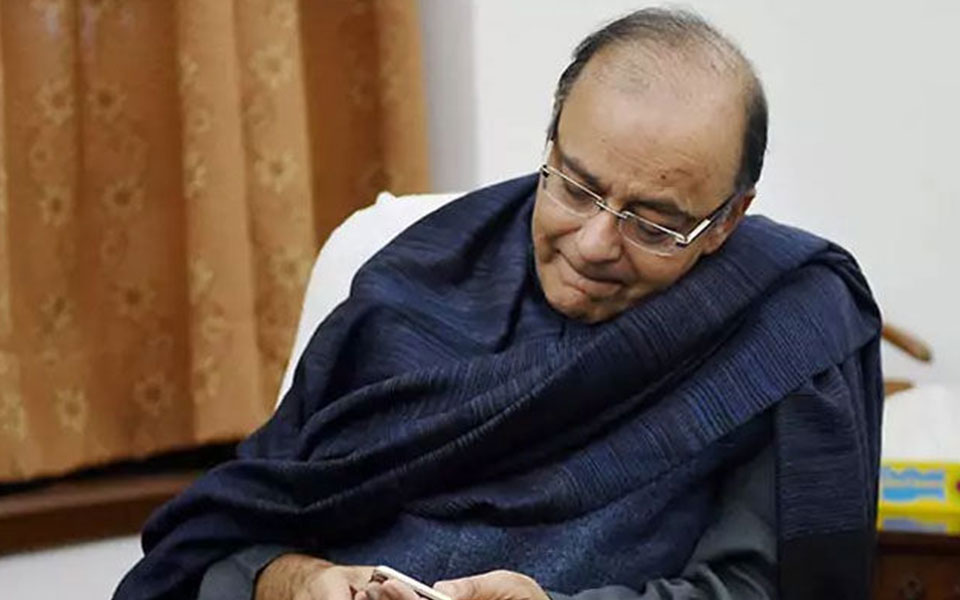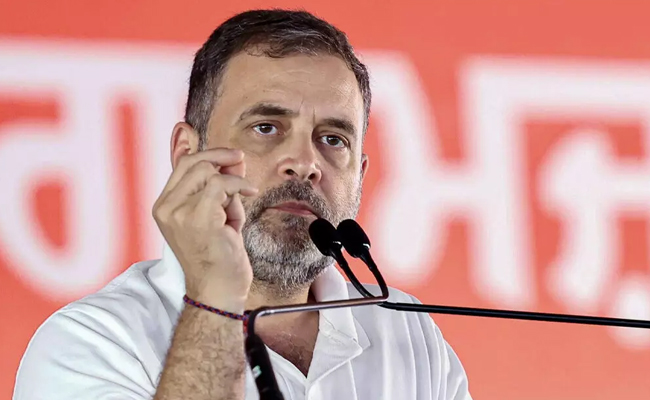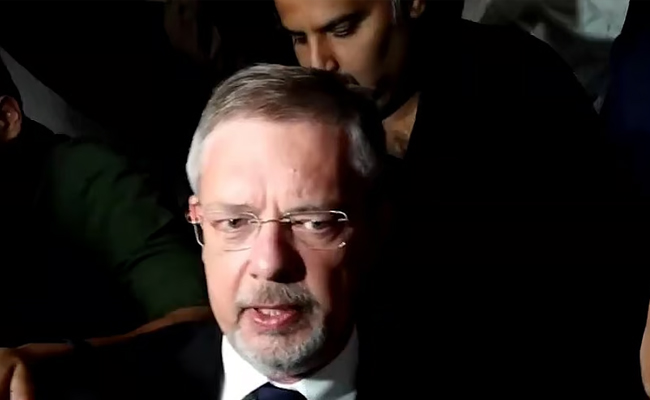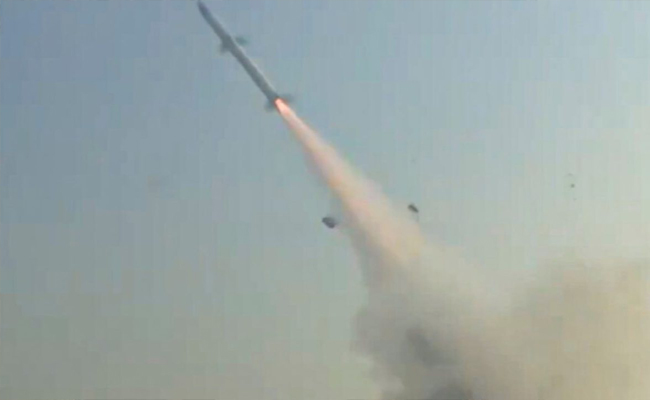New Delhi, July 1: Union Minister Arun Jaitley on Sunday attacked Congress President Rahul Gandhi's idea of a single slab GST for India, terming it flawed.
He added while there would be scope to merge some of the mid-category tax slabs depending on the collections going up, but a single-slab system will not work for India.
"Rahul Gandhi has been advocating a single slab GST for India. It is a flawed idea. A single slab GST can function only in those countries where the entire population has a similar and a higher level of paying capacity," Jaitley wrote in a Facebook post on completion of one year of the Goods and Services Tax (GST).
"Being fascinated by the Singapore model is understandable but the population profile of a state like Singapore and India is very different," he said adding that while Singapore can charge 7 per cent GST on food and on luxury goods, that model won't work here.
"Since GST is a regressive tax, the poor have to be given a substantial relief. Thus most food items - agricultural products and the aam aadmi (common man) used products have to be tax exempt. Some others have to be taxed at a nominal rate. The others could be taxed higher.
"Eventually, as the collections improve, many more items from the 28 per cent category can possibly come down. Only sin products and luxury goods can remain there," he said.
Jaitley also slammed Gandhi and former Finance Minister P. Chidambaram on their demand to bring petroleum products under GST, saying the Congress Finance Ministers in the states were not ready for it.
He said it was the current government which worked out a formula to ensure that "petroleum products would be included in the Constitution amendment providing for the GST but the council can decide the date from which to bring them into GST".
"The UPA kept petroleum products permanently outside GST. On the contrary, we brought them back into the Constitution as levyable to GST and can gradually impose the GST when the GST Council so decides.
"For this I would continue to make my earnest efforts and hopefully when the states are more comfortable with the revenue position, it would be an ideal time to strike for a consensus between them," he said.
Jaitley, who is listed as a minister without portfolio in the Prime Minister's website, also attacked the Congress-led UPA Government for "losing the confidence of the states" when the previous government tried to implement GST.
"In a move towards the single tax system, the UPA asked the states to abolish the Central Sales Tax (CST). It promised the states that it would give them a compensation in lieu of the CST for a certain number of years.
"The states acted accordingly, abolished the CST and the Central government owed the states several thousand crores as CST compensation. When the states demanded CST compensation, the Centre would look the other way," he said.
Jaitley added that when he took over as the Finance Minister, he cleared all the arrears of CST in order to bridge the trust as the states had declared that they would discuss GST only if past CST compensation is paid.
"The CST compensation was paid. The states were then willing to come to the table and move further on the GST," he said.
Jaitley also said after he took over, he agreed to pay to the states, after discussing in the GST Council, a 14 per cent increase of revenue for the first five years for any loss of revenue and the states jumped for this proposal.
Let the Truth be known. If you read VB and like VB, please be a VB Supporter and Help us deliver the Truth to one and all.
New Delhi (PTI): A day after a US submarine torpedoed and sank an Iranian warship in international waters off Sri Lanka's coast, the Congress on Thursday questioned the government's silence with Rahul Gandhi saying that while the country needed a steady hand at the wheel, it has a "compromised PM who has surrendered our strategic autonomy".
Congress president Mallikarjun Kharge said the Modi government's "reckless abdication" of India's strategic and national interests is there for all to see.
"An Iranian ship, a guest of India was returning, unarmed from the International Fleet Review 2026, hosted by us, and was torpedoed in the Indian Ocean Region (IOR). No statement of concern or condolence. PM Modi remains mute," Kharge said on X.
"Why lecture us on the doctrines of MAHASAGAR and India being a 'Net Security Provider' in the IOR, when you can’t react on what is happening in your own backyard? As many as 38 Indian Flag commercial ships along with 1100 sailors are stuck in Gulf of Hormuz," he said.
"Indian sailors, including Captain Ashish Kumar have reportedly died. Why is there no maritime rescue or relief operation in place? You say only 25 days of crude and oil stocks left. With rising oil prices, what is our energy contingency plan, especially in the wake of GOI virtually accepting the demand to stop import of Russian oil? What about the trade of other key commodities with the gulf countries?" the Congress chief said.
As per MEA statement on March 3, "some Indian nationals have lost their lives or are missing", he said.
"There are one crore Indians in the gulf region countries. Medical students are releasing desperate video messages seeking help. How is the GOI securing their well-being? Is there any evacuation plan in place from the affected areas?" Kharge said.
"Clearly, Modi Ji's SURRENDER is both political and moral! It demeans India’s core national interests and destroys our foreign policy carefully and painstakingly built and followed by successive governments over the years!" Kharge said.
Gandhi said the world has entered a volatile phase and "stormy seas lie ahead"
"India's oil supplies are under threat, with more than 40% of our imports transiting the Strait of Hormuz. The situation is even worse for LPG and LNG," he said on X.
"The conflict has reached our backyard, with an Iranian warship sunk in the Indian Ocean. Yet the Prime Minister has said nothing," Gandhi said.
At a moment like this, India needs a steady hand at the wheel, he said.
"Instead, India has a compromised PM who has surrendered our strategic autonomy," Gandhi alleged.
Congress general secretary in-charge communications Jairam Ramesh also said maybe it should not be surprising since the Modi government has still not broken its silence over the targeted assassinations in Iran.
In a significant escalation of the West Asia crisis, a US submarine on Wednesday torpedoed and sank an Iranian warship in international waters off Sri Lanka's coast when it was returning after participating in the Milan naval exercise, a multilateral wargame hosted by India.
In a post on X, Ramesh said the Indian Navy's flagship multilateral exercise, MILAN, was first held in 1995 and the 13th edition was held in Visakhapatnam from February 19 to February 25, 2026 with 18 warships from other countries, including the USA and Iran participating.
The exercise was inaugurated by Defence Minister Rajnath Singh, Ramesh pointed out.
"This makes yesterday's sinking of the Iranian warship that took part in the Milan exercise by a US Navy submarine in the Indian Ocean some 40 nautical miles south of Galle in Sri Lanka all the more extraordinary. The Iranian warship was on its way back home," he said.
This US action has enormous implications for India as well and it is shocking that there has been no official response to it till now, Ramesh said.
"Maybe it should not be surprising since the Modi government has still not broken its silence over the targeted assassinations in Iran. Never before has the Indian government looked so timid and fearful," the Congress leader said.
US Defence Secretary Pete Hegseth, confirming the strike, said at a Pentagon media briefing that it was the first sinking of an enemy warship by a torpedo since World War II.
The Associated Press, quoting the Sri Lankan Navy, reported that 87 bodies were recovered and that 32 people were rescued following the sinking of the warship IRIS Dena.
The incident marks a major escalation of the conflict between the US and Iran outside of the Persian Gulf and throws up questions relating to maritime security in the Indian Ocean that is largely considered as the backyard of the Indian Navy.
The US and Israel launched military strikes on Iran on February 28, killing Iranian Supreme Leader Ayatollah Ali Khamenei.
Following the military offensive, Iran has carried out a wave of attacks mainly targeting Israel and American military bases in several Gulf countries, including the UAE, Bahrain, Kuwait, Jordan and Saudi Arabia.
In the last few days, the conflict has widened significantly with attacks and counter-attacks by both sides.
India has called for resolving the conflict through dialogue and diplomacy.





